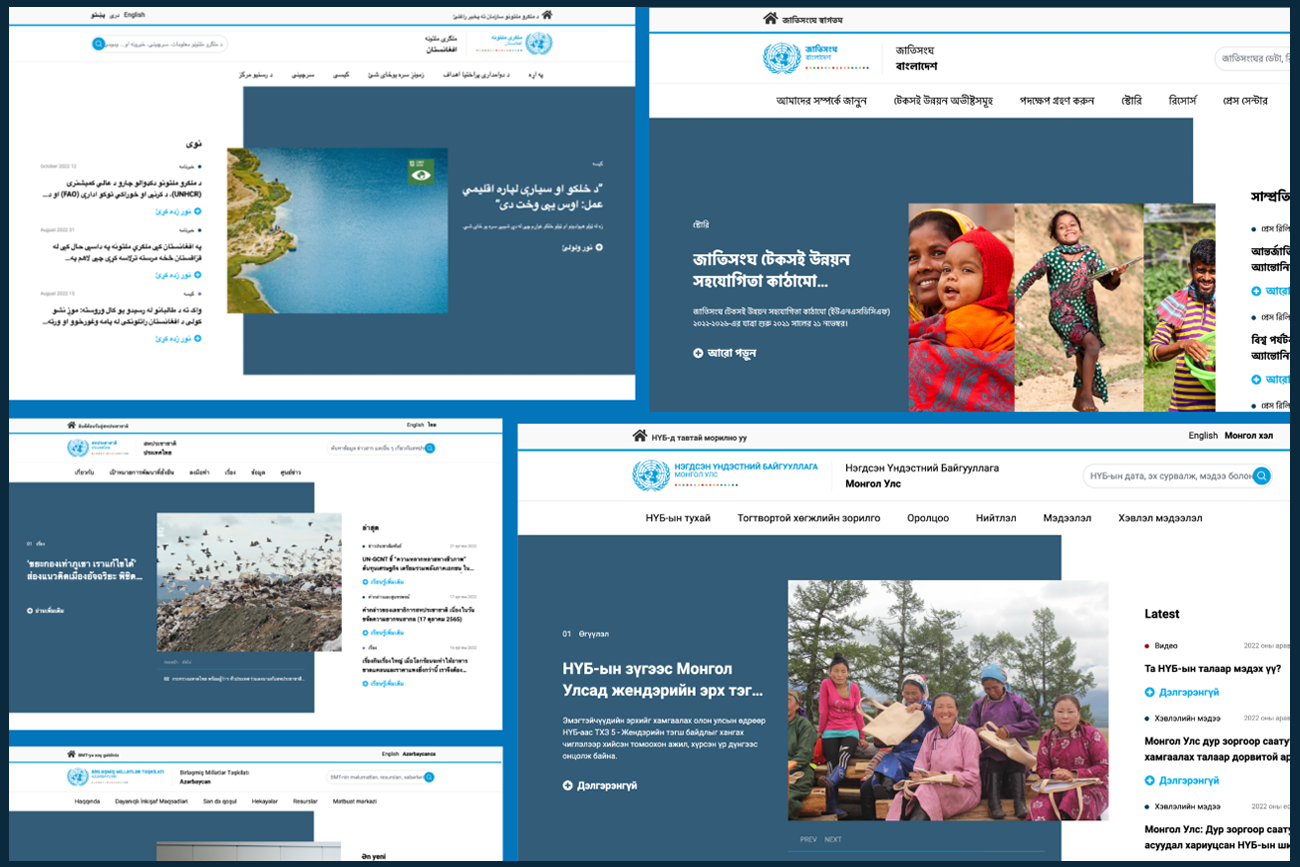Multilingualism, a key ingredient of UN country team websites

This year, we marked a big milestone: The delivery of 132 UN country teams’ websites. For the first time ever, each country team has a website with the same look and feel — and branding — to communicate the work and results of the UN at the country level.
The exercise of helping each country team launch a website was several years in the making. We are now seeing both the technical benefits and the positive impact these sites are having on delivering the UN’s messages, and relaying our results on the ground, to local audiences.
The case for multilingualism
Multilingualism, a core value of our organization, helps the UN promote dialogue, tolerance and understanding. It also boosts engagement with the organization, as well as greater transparency.
To successfully provide country teams with sites that align with this core value, the Development Coordination Office (DCO) paid special attention to the talent hired to support this herculean effort.
Within the core team, a multilingual environment was fostered from day one. Our clients (and colleagues) felt confident knowing that they did not have to jump through hoops to communicate their concerns with the team supporting from Headquarters.
To address inclusivity and foster client orientation, the team provided dedicated training sessions in Arabic, French, English and Spanish to ensure that communications officers felt equipped to drive the vision of digital coherence across country teams.
On the technical front, careful consideration was taken to make sure that any country team could launch a site regardless of language, alphabet or design requirements.
Any user that visits a country team site in a local language will notice that every single element of the website has been thought out, including the translation of each SDG icon. This decision was taken as a commitment to promote multilingualism, transparency and accessibility.
Multilingualism in action
As a result of these efforts, UN country teams successfully launched websites in many different languages.
To date, country teams have published sites in the 6 UN official languages: English (117 websites); French (28 websites); Spanish (25 websites); Arabic (10 websites); Russian (4 websites); and Chinese (1 website).
We also have 29 websites in local languages:
- Albanian: 2 websites - albania.un.org/sq and northmacedonia.un.org/sq
- Armenian: armenia.un.org/hy
- Azerbaijani: azerbaijan.un.org/az
- Bahasa Indonesia: indonesia.un.org/id
- Bangla: bangladesh.un.org/bn
- Belarusian: belarus.un.org/be
- BHS: bosniaherzegovina.un.org/bhs
- Burmese: myanmar.un.org/my
- Haitian Creole: haiti.un.org/ht
- Dari: afghanistan.un.org/prs
- Georgian: georgia.un.org/ka
- Kazakh: kazakhstan.un.org/kk
- Kiswahili: tanzania.un.org/sw
- Kurdish: iraq.un.org/ku
- Kyrgyz: kyrgyzstan.un.org/ky
- Lao: laopdr.un.org/lo
- Macedonian: northmacedonia.un.org/mk
- Mongolian: mongolia.un.org/mn
- Pashto: afghanistan.un.org/ps
- Persian: iran.un.org/fa
- Portuguese: 6 websites - angola.un.org/; brasil.un.org/; caboverde.un.org/; guineabissau.un.org/; mozambique.un.org/; saotomeeprincipe.un.org/
- Romanian: moldova.un.org/ro
- Serbian: serbia.un.org/sr
- Thai: thailand.un.org/th
- Turkish: turkiye.un.org/tr
- Turkmen: turkmenistan.un.org/tk
- Ukrainian: ukraine.un.org/uk
- Uzbek: uzbekistan.un.org/uz
- Vietnamese: vietnam.un.org/vi
Results in numbers
The data and analytics tell the same story. They show the benefits of having UN country team websites in local languages:
- The local language websites of the UN in Viet Nam, Thailand, Ukraine and Türkiye have double the number of page views than their English counterparts do.
- In 2022, 9 out of the 10 most visited UN country team websites had an active site in a local language:
- After launching websites in Russian, UN Kyrgyzstan and Uzbekistan saw a large increase in page views in comparison to their English websites.
Written by the UN Development Coordination Office.





































